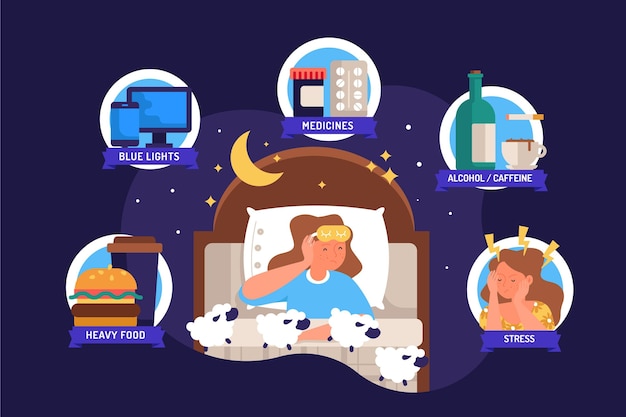
You don’t need to struggle with sleepless nights. Before lack of sleep wreaks havoc on your life, try some simple changes to your daily routine for better sleep. While you might not have complete control over all factors affecting your sleep, you can develop habits to improve it. First, let’s understand sleep more, then look at tips to help you get better sleep.
What Is Sleep?
Sleep is a state where your body and mind rest, making you less aware of your surroundings. Essentially, you’re partially tuning out the world, with many external stimuli blocked from your senses. Normal sleep is marked by a drop in body temperature, breathing rate, and blood pressure, among other bodily functions. Interestingly, studies show the brain remains as active during sleep as when you’re awake. During an 8-hour sleep cycle, adults cycle between non-REM and REM sleep.
Ways to Get Better Sleep
To achieve quality sleep that recharges your body and mind for the next day, follow these tips:
Create and Follow a Sleep Schedule
Go to bed and wake up at the same time every day, including weekends. This consistency helps condition your body to a sleep schedule. If you can’t fall asleep within 15 minutes, get up and do something relaxing, like reading or meditating, then go back to bed when you’re tired. Worrying about falling asleep often makes it harder.
Watch What You Eat and Drink
Don’t go to bed overly full or hungry. Finish eating around three hours before bed so digestion doesn’t disrupt your sleep. Limit liquid intake to avoid nighttime disruptions. Be mindful of caffeine, nicotine, and alcohol—they can either keep you awake or interrupt your sleep later.
Make Your Room Comfortable
Ensure your bedroom is conducive to sleep—cool, quiet, and dark. Remove distractions like the TV and laptop. Consider earplugs, a fan, or blackout curtains if needed. Use a comfortable mattress, pillows, and blankets to improve your sleep quality.
Avoid Daytime Naps
Try not to nap during the day unless absolutely necessary. If you do need a nap, keep it short (15-30 minutes) and take it in the mid-afternoon. However, if you work night shifts, you might need to nap during the day. In that case, make sure your room is dark and free from distractions.
Stay Active
Daily physical activity can help you fall asleep faster and get better quality sleep. Just avoid vigorous exercise close to bedtime, as it can keep you awake. Exercise earlier in the day instead.
Manage Stress
Stress makes falling asleep tough, leading to frequent disruptions. Manage stress through relaxation techniques, exercise, or taking breaks during stressful times. Clear your mind before bed and leave problems for the next day.
When to Contact Your Doctor
Occasional sleepless nights are normal, but if they become frequent, see your doctor. Determining the underlying cause is key to finding the right treatment.
How Much Sleep Is Enough?
Sleep needs vary by age. Infants need 9-10 hours at night plus 3+ hours of naps. Toddlers need around 9-10 hours at night plus 3+ hours of naps. School-age children need at least 9 hours. Adults should aim for 7-8 hours each night.
Dealing with Sleep Disruptions
Sometimes sleep disruptions are unavoidable, like with night shift work or jet lag. Your body will adjust and you can return to your regular sleep schedule.
Important Sleep Tips
Be wary of sleep myths. For example, more sleep isn’t always better—some studies suggest more than 8 hours of sleep might be harmful. Prescription sleep medications aren’t the only solution for insomnia and can sometimes make problems worse. Natural remedies and the tips above can be more effective.
Conclusion
Sleep is crucial for your physical and mental performance. Follow these tips for better sleep, and if they don’t help, consult a sleep specialist or doctor.